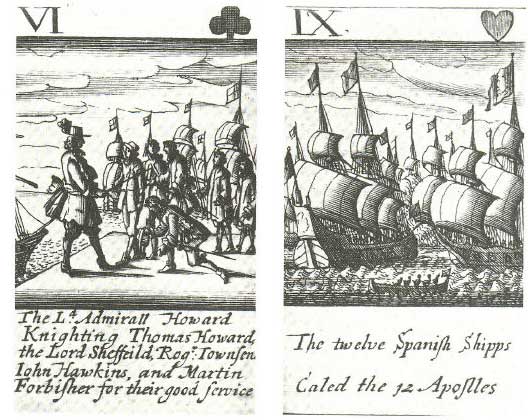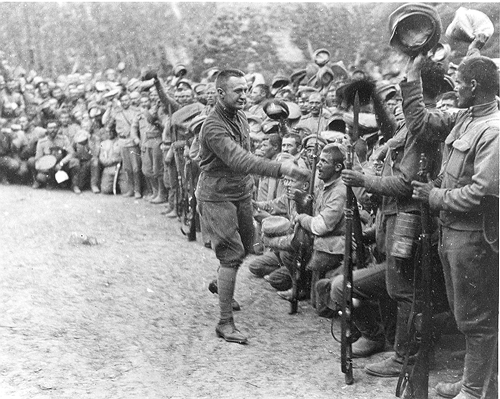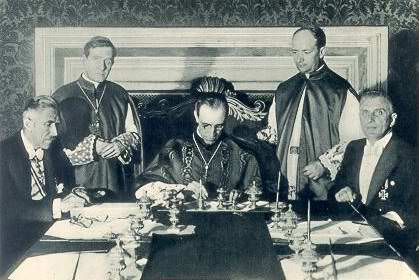
July 20

1402 Tamerlane's Mongols defeat the Ottoman Turks at Angora. "In the 1370s a Turkish-Mongol warrior claiming descent from Genghis Khan fought his way to leadership of the Mongol states of Central Asia and set out to restore the Mongol Empire. His name was Timur Leng (Timur "the Lame," Tamerlane to Europeans, and the "Prince of Destruction" to Asians). With another army of 100,000 or so horsemen, he swept into Persian and Russia, fighting mainly other Muslims. In 1398 he sacked Delhi, murdering 100,000 inhabitants. He rushed west defeating an Egyptian Mameluke army in Syria. In 1402 he defeated a large Ottoman Turk army near modern Anakara. On the verge of destroying....."

1588 The Spanish Armada sets sail from Corunna.

1591 Birth: Anne Hutchinson, religious liberal, one of the founders of Rhode Island.
1726 Colonial clergyman Jonathan Edwards, 23, married Sarah Pierpont, 16. Their marriage prospered for over 30 years, before his premature death in 1758. Sarah herself died only six months later, at 48.
1788 The governor of the French colony of Pondicherry, Vietnam, abandons plans to place King Nhuyen Anh back on the throne.
1801 A 1,235 pound cheese ball is pressed at the farm of Elisha Brown, Jr. The ball of cheese is later loaded on a horse-driven wagon and presented to U.S. President Thomas Jefferson at the White House. The cheese, reportedly 'not very good,' was served to White House guests for years, and years, and years…
1810 Colombia declares independence from Spain.
1861 US Civil War: The Congress of the Confederate States begins holding sessions in Richmond, VA.

1864 US Civil War: The Battle of Peachtree Creek occurs during the Atlanta Campaign. Confederate General John Bell Hood attacks Union forces under General William T. Sherman outside Atlanta.
1867 Imperial troops in Guizhou, China, kill 20,000 Miao rebels.
1868 Legislation that orders US tax stamps to be placed on all cigarette packs is passed.

Sitting Bull Sitting
1881 Five years after General George A. Custer's infamous defeat at the Battle of Little Bighorn, Hunkpapa Teton Sioux leader Sitting Bull surrenders to the US Army, which promises amnesty for him and his followers. Sitting Bull had been a major leader in the 1876 Sioux uprising that resulted in the death of Custer and 264 of his men at Little Bighorn. Pursued by the US Army after the Indian victory, he escaped to Canada with his followers. Born in the Grand River Valley in what is now South Dakota, Sitting Bull gained early recognition in his Sioux tribe as a capable warrior and a man of vision. In 1864, he fought against the US Army under General Alfred Sully at Killdeer Mountain and thereafter dedicated himself to leading Sioux resistance against white encroachment. He soon gained a following in not only his own tribe but in the Cheyenne and Arapaho Native American groups as well. In 1867, he was made principal chief of the entire Sioux nation. In 1873, in what would serve as a preview of the Battle of Little Bighorn three years later, an Indian military coalition featuring the leadership of Sitting Bull skirmished briefly with Lieutenant Colonel George Armstrong Custer. In 1876, Sitting Bull was not a strategic leader in the US defeat at Little Bighorn, but his spiritual influence inspired Crazy Horse and the other victorious Indian military leaders. He subsequently fled to Canada, but in 1881, with his people starving, he returned to the United States and surrendered. He was held as a prisoner of war at Fort Randall in South Dakota territory for two years and then was permitted to live on Standing Rock Reservation straddling North and South Dakota territory. In 1885, he traveled for a season with Buffalo Bill Cody's Wild West show and then returned to Standing Rock. In 1889, the spiritual proclamations of Sitting Bull influenced the rise of the "Ghost Dance," an Indian religious movement that proclaimed that the whites would disappear and the dead Indians and buffalo would return. His support of the Ghost Dance movement had brought him into disfavor with government officials, and on December 15, 1890, Indian police burst into Sitting Bull's house in the Grand River area of South Dakota and attempted to arrest him. There is confusion as to what happened next. By some accounts, Sitting Bull's warriors shot the leader of the police, who immediately turned and gunned down Sitting Bull. In another account, the police were instructed by Major James McLaughlin, director of the Standing Rock Sioux Agency, to kill the chief at any sign of resistance. Whatever the case, Sitting Bull was fatally shot and died within hours. The Indian police hastily buried his body at Fort Yates within the Standing Rock Reservation. In 1953, his remains were moved into Mobridge, South Dakota, where a granite shaft marks his resting place.
1894 2000 federal troops are recalled from Chicago having ended the Pullman strike.
1910 The Christian Endeavor Society of Missouri begins a campaign to ban all motion pictures that depict kissing between non-relatives.

Kerensky shaking hands
1917 Russian Revolution: Prince Lvov resigns and Kerensky becomes Prime Minister and head of the provisional government.
1917 WW1: The draft lottery goes into operation.
1920 Birth: Elliot L Richardson, US Attorney General and Secretary of Defense.

Villa
1923 Mexican revolutionary and guerrilla leader Pancho Villa is murdered in his ranch in Parral, Chihuahua, Mexico. During the Mexican Revolution he fought the regimes of both Porfirio Diaz and Victoriano Huerta, and became one of the most wanted men by the US army.
1927 King Ferdinand of Romania dies and Prince Michael is proclaimed as King.
1930 A Polish census shows 3,113,900 Jews in Poland (9.8% of the population). Almost 80% of Jews declare Yiddish to be their mother tongue. Per capita income for Jews is 830 zloty and 585 for non-Jews. Jews account for 40% of Poland's university graduates.
1932 A State of Emergency is declared in Germany.

1933 Church and Reich: Papen and Pacelli formally sign the Concordat in an elaborate ceremony at the Vatican. Reich Minister of the Interior Frick announces that now the entire German government is now under the control of Adolf Hitler and that the Hitler salute is henceforth to be generally used as the German greeting. A number of contemporary historians consider this to be the day Hitler's dictatorship of Germany actually begins.
1933 The Jewish Economic Conference opens its preliminary session in Amsterdam. It seeks an intensified anti-Nazi boycott.
1933 More than 30,000 men, women and children jam the streets of London protesting Nazi persecution of German Jews, as the Academic Assistance Council is organized to aid expelled German Jewish scholars.
1934 The SS is strengthened and takes over control of most of the concentration camps formerly under SA control. (Days)
1935 Holocaust: The Gestapo closes down Jewish-owned shop on the Kurfuerstendam in Berlin.
1937 Death: Guglielmo Marconi, who played a major role in the development of early radio. Born in Italy, he studied engineering. Marconi began experimenting with crude radio devices at the age of 20, and he later moved to England, where he won government support for his work. Marconi filed a telegraphy patent in 1896, and two years later, he transmitted wireless telegraph signals across the Atlantic. He founded Marconi's Wireless Telegraphy Service, and in 1900, he patented "improvements for the apparatus of wireless telegraphy." The patent was later overturned based on previous work by Nicola Tesla and others. In 1899, a US newspaper asked Marconi to rig two ships with wireless telegraphs, so they could transmit the results of a yacht race. Marconi's system would later enable ships to send distress calls. Marconi made important discoveries about short-wave radio that became the basis for modern long-distance radio. In 1909, he won the Nobel Prize for Physics.
1938 Holocaust: All members of the Wehrmacht are forbidden to live in Jewish-owned homes or apartments.
1941 Church and Reich: Bishop Galen of Munster, known as a courageous critic of the Nazis, expresses his hope for a German victory in Russia.
1942 WW2: The first detachment of the Women's Army Auxiliary Corps, (WACS) begin basic training at Fort Des Moines, Iowa.

1943 The Secret Diary of Anti-Hitler Conspirator Ulrich von Hassel: (Ebenhausen) Discussion with Dieter on Hitler's foreign policy before and after the outbreak of the war. I worked out the following ideas: the "inner" basis of the whole evil is a hybris-like immoderation coupled with a complete ignorance of the world. The malignant core was formed by the policy which, in forming a military bloc with Italy and Japan, brought about the division of the world into two camps - with the balance of power weighted against Germany. The decisive turning point to the explosion of war was the occupation of Prague. All the previous actions, especially the "Anschluss" and the incorporation of the Sudetenlond, would have been tolerated by the world. "Munich" meant that these events were "swallowed", but with the firm resolve not to leave further German aggression unanswered. There is absolutely no reason to believe Hitler's assertion that after Munich England was resolved to attack Germany as soon as she was strong enough. The English resolve was rather to put themselves in a position militarily to resist any further aggression on the part of Hitler, having learned their lesson from the events up till then, and putting no trust in his assurances. Even then, it is highly probable that with a skillful German policy, England would not have prevented an opportune removal of the Corridor. So these men launched the war against Poland, in their criminal wantonness running the risk of the Western Powers' intervention, in complete failure to recognize the ratio of power, and, worst of all, with not the least idea of the significance of the sea as a factor. They thought the necessary security had been guaranteed by the pact with Russia, although they themselves had made this step with the thought in the back of their minds that came to light in 1941. There is no basis for the argument that Russia was about to attack or would have attacked. This is one of the most evil examples of preventive war which Bismarck condemned. If Germany "stumbled" into the two-front war in 1914, Hitler wantonly leaped into it in 1941. Russia had only one feeling towards an intact Germany, that of fear. It is out of the question that Russia would have attacked Germany as long as Germany possessed an unbroken army."
von Stauffenberg
1944 The Bomb Plot: Colonel Count Claus Schenk von Stauffenberg attempts to assassinate Hitler at the Wolf's Lair, his East Prussian headquarters. The bomb explodes only a few feet from Hitler, but only slightly wounds him. This stroke of luck only strengthens Hitler's conviction that 'fate' wants him to continue his struggle to the very end. (An extremely detailed minute by minute account: http://www.joric.com/Conspiracy/July20.htm)

Hitler and Mussolinin view damage
1944 The Bomb Plot: Conspirators in both Berlin and Paris mobilize forces in an attempt to seize power, but indecisive leadership caused by the lack of confirmation of Hitler's death and the subsequent news of his survival make a farce of the putsch. Most conspirators, as well as many targets of opportunity, are subsequently imprisoned or executed.
Remer
1944 The Making Of Otto Remer: Born on August 18, 1912, Remer volunteered for service in the German army in 1930 and served as a front-line officer in France, the Balkans and on the eastern front. After promotion to Major and then Colonel, in 1944 he was chosen to command the "Grossdeutschland" guard regiment in Berlin. In this post, the 31-year-old officer played a historically pivotal role in putting down the attempt by a small circle of insurgent officers to kill Hitler and seize control of the government. On the afternoon of July 20, 1944, General Paul von Hase, the military commander in Berlin and a leader in the anti-Hitler conspiracy, announced to Remer, who was never a member of the Nazi Party, that Hitler was dead, that civil disorder had broken out, and that the army was assuming overall authority in Germany. Hase ordered Remer immediately to seal off key government buildings in central Berlin. Hesitating to carry out this highly unusual order, Remer decided to contact Joseph Goebbels to confirm its validity. After telling the skeptical and uncertain Remer that Hitler was not dead, the propaganda minister and Berlin Gauleiter arranged for him to speak directly with the Führer by telephone at his military headquarters in East Prussia. "Major Remer, can you hear me, do you recognize my voice?," Hitler began. After explaining that an attempt on his life had failed, he gave Remer complete authority in Berlin to suppress the conspiracy. Remer and his men moved quickly to put down the revolt, which had been poorly planned and organized. Five months later, Remer commanded the elite "Panzer Führer-Begleitbrigade" during the ill-fated "Battle of the Bulge" offensive. Following his promotion by Hitler on January 30, 1945, to the rank of Major General he was given command of tens of thousands of soldiers of the legendary "Panzer Führer-Begleitdivision." During the war's final months, he and his men fought off vastly superior Soviet forces, thereby rescuing hundreds of thousands of refugees who were fleeing the advancing Red troops. Remer showed exemplary courage and valor in combat, and was wounded numerous times in battle.
1944 The Bomb Plot: Hitler broadcasts a speech to the German people to ensure them of his survival. An Excerpt: "A very small clique of ambitious, unscrupulous, criminal and stupid officers formed a conspiracy to do away with me and at the same time to wipe out virtually the entire staff of the German High Command. The bomb that was planted by Colonel von Stauffenberg exploded two meters to my right. It seriously injured a number of my colleagues who are very dear to me; one has died. I myself am completely unhurt apart from a few minor skin abrasions, bruises and burns. I interpret this as....."
1944 WW2: US President Franklin 'Horse In The Middle Of The Stream' Roosevelt is nominated for an unprecedented fourth term of office at the Democratic National Convention in Chicago; a convention FDR doesn't even bother to attend.
1944 WW2: July 20-29 Joint AK/Red Army operations inflict 1,400 German deaths.
1944 WW2: Diary of Leon Gladun: We change our position--it seems our last before we get a rest. We're on the other side of Castel d' Emilio now.

1945 2000 people attend a rally at Olympic Auditorium in Los Angeles to protest Gerald LK Smith's racist and antisemitic activities in Southern California.
1949 Israel's 19 month war of independence ends in victory.
1950 Korea: The US Army's Task Force Smith is pushed back by superior North Korean forces.
1951 Death: While entering a mosque in the Jordanian sector of east Jerusalem, King Abdullah of Jordan is assassinated by a Palestinian nationalist. Abdullah was a member of the Hashemites, an Arab dynasty said to be directly descended from the Prophet Muhammad. During WWI, with British support, Abdullah led an Arab revolt against Turkish rule in Jordan. In 1921, the British made him the emir of Transjordan, and with Jordanian independence in 1946 he became the country's monarch. Two years later, he led his armies against the newly declared state of Israel, and Jordan annexed east Jerusalem along with the portions of Palestine now known as the West Bank. In 1951, his efforts to create an Arab federation under Hashemite rule ended when he was assassinated in Jerusalem. After a brief sojourn on the Jordanian throne, Abdullah's son was declared mentally unfit to rule and was replaced by Abdullah's grandson, Hussein bin Talal, King Hussein, who ruled until he died in 1999.
1960 The USS George Washington becomes the first submerged submarine to fire a Polaris missile.
1960 The USSR recovers two dogs, the first living organisms to return from a space flight.

1969 Apollo 11 astronauts Neil Armstrong and Edwin E. Aldrin, Jr. become the first men to walk on the moon.

1974 Turkish forces invade Cyprus.
1976 America's Viking I robot spacecraft makes a successful landing in the most boring region of Mars.
1982 US President Ronald Reagan pulls the U.S. out of comprehensive test ban negotiations indefinitely.
1988 Michael Dukakis is selected as the Democratic presidential nominee.
1990 Iran-Contra: A federal appeals court sets aside Oliver North's Iran-Contra convictions, reversing one outright.

Havel
1992 Vaclav Havel, the playwright who led the Velvet Revolution against communism, resigns as president of Czechoslovakia.
1993 White House deputy counsel Vincent Foster Jr. is found shot to death, an apparent suicide, in a park near Washington, DC.
1997 Seven people are arrested after New York City police find scores of deaf Mexicans kept in slave-like conditions and forced to peddle trinkets for the smugglers who had brought them to the U.S.
1998 Russia wins a $11.2 billion loan from the International Monetary Fund to help avert the devaluation of its currency.
2001 Protesters clash with police in Genoa as world leaders arrived in the Italian port city for the G8 summit.

2002 Post 911: Six different proposed WTC Development Plans are presented at NYC's Javits Center Convention Hall.
2003 In India, elephants used for commercial work begin wearing reflectors to avoid being hit by cars during night work.
2004

Visit:




 Visit:
Visit:

Click Here to email the History: One Day At a Time webmaster.